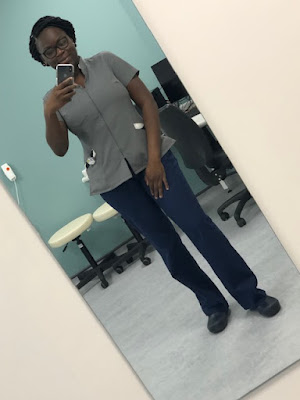Being a Therapeutic Radiographer - The Highs and Lows
Being a
Therapeutic Radiographer – The Highs and Lows
So I recently got some women from the social club
(PowerQueens) that I’m part of to ask me a few questions and decided to also
share the questions and my response in this week’s post.
But before we get into the post and all that good stuff…are
you a young lady living in London, are you free every fortnight on Wednesdays?
Are you looking for like-minded, ambitious and eloquent women or a new
sisterhood to socialise with?...then drop me a comment in the comment section and
I’ll happily connect you.
Who is a therapeutic radiographer or what does It
involve?
They are qualified healthcare professional that treats
people with cancer using radiation, it takes three years of both academical
study and clinical training alongside a range of clinical competencies before
one can become a qualified radiotherapist. Working as a radiotherapist is one
of the most gratifying and fulfilling professions out there, knowing that you
are helping people, making them laugh or smile in one of the most difficult
journeys in their life.
Seeing patients with their other half or families from the
time they are informed of their cancer diagnosis to their first appointment for
pre-treatment chat/ scan up to the last day of treatment. Meeting these patients
enables us to not only build a bond but almost a friendship with short
expiration dat. A friendship that is inevitable from seeing someone Monday to
Friday for four to seven and half weeks varying depending on the type of
treatment they are having.
What would you consider as “high” in your role as a
radiographer?
-
Seeing patients that I have been involved in
their treatment either heavily or sparingly after treatment coming in for their
follow-up appointment; whereby they look refreshed, healthier and even happier.
-
Even the moment patient receives the “all clear”
from their consultant, that moment of joy as well as the warm embrace shared
with their loved ones or families is simply indescribable.
-
The moments shared with each patient is unique
and different in their particular way, for example treating and interacting
with a breast cancer patient that will be walking down the aisle in a few
months, or a cervical cancer patient who is about to become a grandma for the
first time or a prostate patient who will be starting a new career and many
more.
-
Hearing feedback within multidisciplinary
meeting, receiving compliments of how much the service rendered has helped and
how our short interaction has helped them fight each and everyday is
unquantifiable.
-
Being able to identify different types of
chocolate received by patients either Quality Street, Lindt, Roses, Heroes,
Celebration and many more while wearing a blindfold or covering your
eyes…..seriously are you even a radiographer if you cannot identify the
different types of chocolates? LOL!!!
What would you consider as “low” in your role as a
radiographer?
-
Meeting a patient who have been treated
previously being diagnosed with metastases is one of the most heart-breaking moments
of the job especially patients that are younger. This is an aspect of the job
which is no one ever prepares you for or could even prepare you enough. However,
I do believe that this part of the job should be discussed more within the
course as a student to at least prepare them mentally and emotional. Likewise,
professionals should be given adequate support such as counselling and mindfulness
to ensure everyone understands the importance of expressing emotions rather
than suppressing them.
-
Supporting and encouraging palliative patients
through treatment(s) despite how dejected and disheartened they may feel.
Overall, as mentioned earlier dealing with cancer patients
can never be an easy job but it is satisfying and rewarding in knowing that our
acts of service are making a difference to someone’s day, life and family.
Although, patients can easily be made to feel like just another number in the
queue. I am a firm believer that patients should be treated more than their
diagnosis, they are just not another breast, prostate or any other diagnosis
with which I am sure every healthcare professional upholds. However, this can
also be easily done due to the workload and pressure of treating patients on
time and dealing with any other issues that may arise such as machine breakdown
and staffing issues.
These patients must always be at the core focus of our
duties; they are mothers, fathers, sisters, brothers, aunties, uncles, grandma,
grandpa, daughter, son etc first before
their cancer diagnosis and should always be treated as such.
With Love,
Mary
xxx


Loved this! Keep them coming
ReplyDeleteThank you so much Rhoda.....will do!
DeleteWith Love,
Mary xxx
Really appreciate this!! I am in my last academic year of Uni, about to qualify as a Therapeutic Radiographer. I feel that we need more of this and more awareness as most people don't understand the profession or what we actually do. Thank you loads! Would you also be willing to publish something about the job progression or posts within Radiotherapy please?
ReplyDeleteHi Kudzi,
DeleteThank you so much for your kind comment. I definitely will be posting more about the profession and RT itself, so please stay tuned. I wish you all the best in your final exams as well.
With Love,
Mary xxx